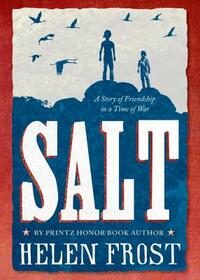Take a photo of a barcode or cover
Besides the Anne of Green Gables series, I haven't really dipped my toes into historical fiction that is geared toward the children's audience. This book was a neat introduction into that genre.
Set in 1812 in the Indiana territory around Fort Wayne, two boys from two different worlds have a thriving friendship, free of any prejudices or political loyalties. James is the son of a family of settlers who run a trading post outside of the fort, and Anikwa is a young boy from the Miami tribe, who have lived on the land for hundreds of years. When war comes to the area, the boys' friendship is tested, especially because of conflicting opinions from the various adults and children within their circles.
Probably off topic, but this book reminded me of how history continues to repeat itself. Everywhere in the world where there are wars or rebellions, there are always two conflicting sides. The stories that are not often told are of those that remain neutral, or see good and bad on each side. I can't help but think of Hutus who hid Tutsi neighbors, risking the lives of their families in order to do the "right thing" during the Rwandan genocide. Likewise in Nazi occupied Europe, when many of Hitler's targets were given shelter and hiding places until the end of the war.
What a great little read. Surprisingly profound. I was sent an audio compact disc edition by the publisher, but in reading other reviews, it appears that the actual book is written in verse. What an interesting format! I'll have to revisit this one in book format.
Set in 1812 in the Indiana territory around Fort Wayne, two boys from two different worlds have a thriving friendship, free of any prejudices or political loyalties. James is the son of a family of settlers who run a trading post outside of the fort, and Anikwa is a young boy from the Miami tribe, who have lived on the land for hundreds of years. When war comes to the area, the boys' friendship is tested, especially because of conflicting opinions from the various adults and children within their circles.
Probably off topic, but this book reminded me of how history continues to repeat itself. Everywhere in the world where there are wars or rebellions, there are always two conflicting sides. The stories that are not often told are of those that remain neutral, or see good and bad on each side. I can't help but think of Hutus who hid Tutsi neighbors, risking the lives of their families in order to do the "right thing" during the Rwandan genocide. Likewise in Nazi occupied Europe, when many of Hitler's targets were given shelter and hiding places until the end of the war.
What a great little read. Surprisingly profound. I was sent an audio compact disc edition by the publisher, but in reading other reviews, it appears that the actual book is written in verse. What an interesting format! I'll have to revisit this one in book format.
The book was depressing, especially because you know what the outcome (in the future) will be with Native people's. However, the book had a really nice ending. It makes you believe we can all still be friends. The two characters and their families still cared about each other, even after all that happened.
I enjoyed this book about the friendship between an American settler boy and a Native American boy set during the War of 1812. I liked the perspective, although I sometimes wondered at how real James and his family were. In historical fiction too often we try to prettify our history by telling it through sympathetic narrators.
An interesting but depressing story, good poetry, good history. Accessible for middle school students!
reflective
tense
fast-paced
Plot or Character Driven:
Plot
Strong character development:
No
Loveable characters:
Complicated
Diverse cast of characters:
Yes
Flaws of characters a main focus:
Complicated
Whenever I pick up a verse novel, the first thing that goes through my head is the question, "why this story in this format?" That is, what is it about this story or these characters that makes the author feel like verse would work better than prose to communicate the narrative?
Sometimes, there's a good answer. In The Wild Book, the narrator has tried writing in poetry as a way to help her dyslexia. In The One and Only Ivan (which, while not a full-on verse novel, has certain verse novel elements), the clipped, understated narration is meant to help show what it's like inside a gorilla's head.
More often, however, I can't find an answer that satisfies me. And that was probably my biggest complaint about Salt -- that I was never able to answer that question to my satisfaction. True, it allows for the book to switch quickly between its protagonists, but that's something that can be done in pure prose form too, and I think it might have benefited from that approach.
I also felt like the brief nature of all the scenes meant that the characterization wasn't particularly deep. We get a fairly good feel for James and Anikwa, the narrators, but the secondary characters end up painted in very broad strokes. Even with James and Anikwa, I felt like the characterization didn't have enough nuance for their conflict halfway through the book to really feel natural.
A lot of the language is beautiful -- anyone who loved Step Gently Out last year knows that Helen Frost is highly skilled with imagery. I'm not sure I felt like all the line breaks were purposeful enough, however, and I don't think that giving all of Anikwa's poems a specific shape on the page (one that's sort of like three stacked balls) helped with that challenge.
I did enjoy the setting -- the war of 1812 isn't a popular choice for children's books, and the portion of the conflict that didn't take place around the Chesapeake Bay even less so. I did feel like I'd spent some time in an interesting place after I'd finished the book.
The setting, however, was the only facet of the book that I felt was truly distinguished.
A longer version of this review appears at abouttomock.blogspot.com
Sometimes, there's a good answer. In The Wild Book, the narrator has tried writing in poetry as a way to help her dyslexia. In The One and Only Ivan (which, while not a full-on verse novel, has certain verse novel elements), the clipped, understated narration is meant to help show what it's like inside a gorilla's head.
More often, however, I can't find an answer that satisfies me. And that was probably my biggest complaint about Salt -- that I was never able to answer that question to my satisfaction. True, it allows for the book to switch quickly between its protagonists, but that's something that can be done in pure prose form too, and I think it might have benefited from that approach.
I also felt like the brief nature of all the scenes meant that the characterization wasn't particularly deep. We get a fairly good feel for James and Anikwa, the narrators, but the secondary characters end up painted in very broad strokes. Even with James and Anikwa, I felt like the characterization didn't have enough nuance for their conflict halfway through the book to really feel natural.
A lot of the language is beautiful -- anyone who loved Step Gently Out last year knows that Helen Frost is highly skilled with imagery. I'm not sure I felt like all the line breaks were purposeful enough, however, and I don't think that giving all of Anikwa's poems a specific shape on the page (one that's sort of like three stacked balls) helped with that challenge.
I did enjoy the setting -- the war of 1812 isn't a popular choice for children's books, and the portion of the conflict that didn't take place around the Chesapeake Bay even less so. I did feel like I'd spent some time in an interesting place after I'd finished the book.
The setting, however, was the only facet of the book that I felt was truly distinguished.
A longer version of this review appears at abouttomock.blogspot.com
This is probably my favorite of Frost's books. Her 2 male protagonists, 11 year olds Anikwa and James, are realistically created, and the actions are faithful to the history from 1812. Moving, beautifully written and a great read for children 8-14. So far, one of my favorites this year.
http://librarianosnark.blogspot.com/2014/01/review-salt.html
In 1812 in Indian Territory, two boys forge a friendship over hunting, fishing and survival of their families. James’ family runs the trading post at Fort Wayne, living right outside the walls of the fort. Anikwa’s family, members of the Miami tribe, has lived on this land for generations. Now two armies are heading right to Fort Wayne to battle, the Americans and British will meet for a critical battle. The question becomes whose side the Miami will be on when the battle occurs. But even more deep is the question of whether the friendship between the two boys and their two families can survive this battle and the losses that it brings.
Frost has mastered the verse novel, creating a work that functions as beautiful poetry with profound depths and also as a complete novel. Frost puts a human face on history in this novel that tells the story of a major battle in the war of 1812. By the time the soldiers arrive, readers care deeply for both boys and their families. So when the destruction starts, the wounds are real and the losses far beyond numbers. The poems show readers the beauty of the landscape, the bounty of the land, and all that is possibly lost afterwards.
Frost writes from both boys’ points of view in alternating poems. So the lifestyle and losses of both families is shown from their own points of view. Anikwa’s poems are done in a poetic form that creates a pattern on the page. Frost explains in her notes at the end that this is to mimic Miami ribbon work. Without knowing this while reading, I could still see the square form of James’ poem representing the fort and the home he lived in next to the motion-filled form of Anikwa’s poems that exuded nature.
An exquisite verse novel that fills history with real people and war with real loss. Appropriate for ages 11-13.
Frost has mastered the verse novel, creating a work that functions as beautiful poetry with profound depths and also as a complete novel. Frost puts a human face on history in this novel that tells the story of a major battle in the war of 1812. By the time the soldiers arrive, readers care deeply for both boys and their families. So when the destruction starts, the wounds are real and the losses far beyond numbers. The poems show readers the beauty of the landscape, the bounty of the land, and all that is possibly lost afterwards.
Frost writes from both boys’ points of view in alternating poems. So the lifestyle and losses of both families is shown from their own points of view. Anikwa’s poems are done in a poetic form that creates a pattern on the page. Frost explains in her notes at the end that this is to mimic Miami ribbon work. Without knowing this while reading, I could still see the square form of James’ poem representing the fort and the home he lived in next to the motion-filled form of Anikwa’s poems that exuded nature.
An exquisite verse novel that fills history with real people and war with real loss. Appropriate for ages 11-13.




